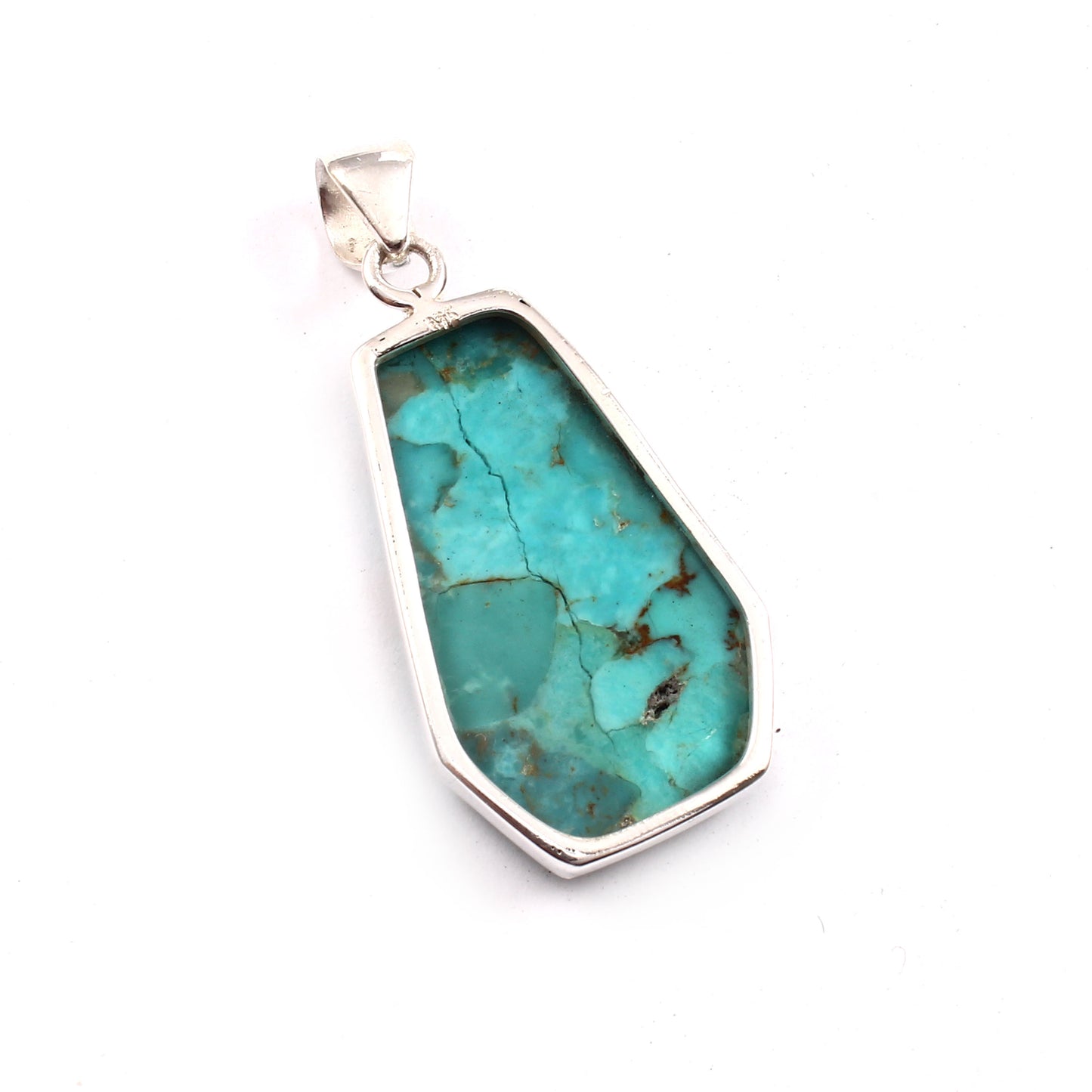exopearl
Kingman Blue Turquoise Pendant, 925 Sterling Silver, Blue Mohave Pendant, Coffin Pendant, Fashion Jewelry, 35Ct Approx.
Kingman Blue Turquoise Pendant, 925 Sterling Silver, Blue Mohave Pendant, Coffin Pendant, Fashion Jewelry, 35Ct Approx.
Não foi possível carregar a disponibilidade de retirada.
- Perfect Gift
- 925 Silver
- Gemstone
EVERY STONE HAVE DIFFERENT TEXTURE.
Item Code: AKP - 0013
Item : Jewelry
Jewelry Type : Pendant
Pendant Shape : Coffin
Metal : 925/92.5 Sterling Silver
Plating : Silver
Stamp : 92.5
Material : Gemstone
Gemstone : Blue Mohave ( Handcrafted )
Polish : Excellent
Weight: 32 Ct Approx.
...............................
**Keep the jewelry away from direct heat, water, perfumes, deodorants, and other strong chemicals. Wipe the Jewellery gently with a chamois cloth or leather swatch after every use. Wiping the jewelry with a soft cloth after removing the jewelry would add to its life. Preserve your Jewellery in the original box or in a soft cloth pouch**
Jewellery or jewelry (American English; see spelling differences) consists of decorative items worn for personal adornment, such as brooches, rings, Charms , earrings, pendants, and cufflinks. Jewellery may be attached to the body or the clothes. From a western perspective, the term is restricted to durable ornaments, excluding flowers for example. For many centuries metal such as gold used in different carats from 21, 18, 12, 9 or even lower, often combined with gemstones, has been the normal material for jewellery, but other materials such as shells and other plant materials may be used. It is one of the oldest type of archaeological artefact – with 100,000-year-old made from Nassarius shells thought to be the oldest known jewellery.[1] The basic forms of jewellery vary between cultures but are often extremely long-lived; in European cultures the most common forms of jewellery listed above have persisted since ancient times, while other forms such as adornments for the nose or ankle, important in other cultures, are much less common.
Jewellery may be made from a wide range of materials. Gemstones and similar materials such as and coral, precious metals, and shells have been widely used, and enamel has often been important. In most cultures jewellery can be understood as a status symbol, for its material properties, its patterns, or for meaningful symbols. Jewellery has been made to adorn nearly every body part, from hairpins to toe rings, and even genital jewellery. In modern European culture the amount worn by adult males is relatively low compared with other cultures and other periods in European culture.
The word jewellery itself is derived from the word jewel, which was anglicised from the Old French "jouel",[2] and beyond that, to the Latin word "jocale", meaning plaything. In British English, Indian English, New Zealand English, Hiberno-English, Australian English, and South African English it is spelled jewellery, while the spelling is jewelry in American English.[3] Both are used in Canadian English, though jewelry prevails by a two to one margin. In French and a few other European languages the equivalent term, joaillerie, may also cover decorated metalwork in precious metal such as objets d'art and church items, not just objects worn on the
Form and function
Humans have used jewellery for a number of different reasons:
functional, generally to fix clothing or hair in place
as a marker of social status and personal status, as with a wedding ring
as a signifier of some form of affiliation, whether ethnic, religious or social
to provide talismanic protection (in the form of amulets)[4]
as an artistic display
as a carrier or symbol of personal meaning – such as love, mourning, a personal milestone or even luck
superstition
Materials and methods
Hair ornament, an Art Nouveau masterpiece; by René Lalique; circa 1902; gold, emeralds and diamonds; Musée d'Orsay (Paris)
In creating jewellery, gemstones, coins, or other precious items are often used, and they are typically set into precious metals. Platinum alloys range from 900 (90% pure) to 950 (95.0% pure). The silver used in jewellery is usually sterling silver, or 92.5% fine silver. In costume jewellery, stainless steel findings are sometimes used.
Other commonly used materials include glass, such as fused-glass or enamel; wood, often carved or turned; shells and other natural animal substances such as bone and ivory; natural clay; polymer clay; Hemp and other twines have been used as well to create jewellery that has more of a natural feel. However, any inclusion of lead or lead solder will give a British Assay office (the body which gives U.K. jewellery its stamp of approval, the Hallmark) the right to destroy the piece, however it is very rare for the assay office to do so.ethods including forging, casting, soldering or welding, cutting, carving and "cold-joining" ( using adhesives, staples and rivets to assemble parts )
Shipping
Shipping
🌍 Worldwide Shipping: We offer reliable and fast shipping services to customers around the globe.
🚚 Processing Time: Orders are processed within 1-2 business days, ensuring swift dispatch.
📦 Shipping Options: Choose from various shipping options to suit your needs, including standard and expedited services.
🎁 Packaging: Every order is carefully packaged to ensure your items arrive in perfect condition, reflecting our commitment to quality.
🔒 Tracking: Track your order in real-time with our provided tracking information for added peace of mind.
🌐 International Customs: Please note that international customers are responsible for any customs or import duties that may apply.
💼 Returns: Check our return policy for hassle-free returns and exchanges.
Your satisfaction is our priority, and we strive to make your shopping experience seamless from checkout to delivery. Feel free to contact us with any shipping-related inquiries. Happy shopping! 🛍️






